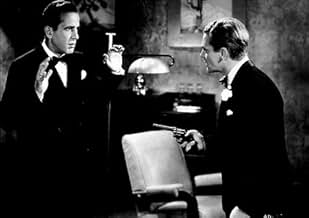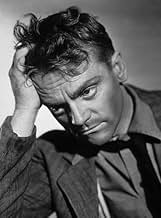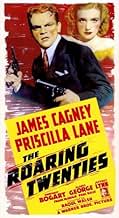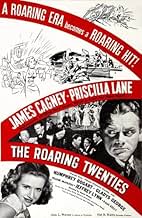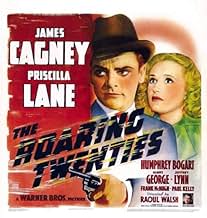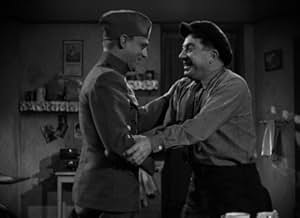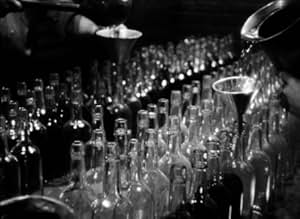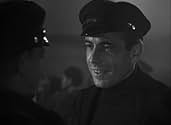ÉVALUATION IMDb
7,9/10
17 k
MA NOTE
Trois hommes de retour au pays tentent de gagner leur vie dans l'Amérique de la prohibition, après avoir combattu ensemble durant la Première Guerre mondiale.Trois hommes de retour au pays tentent de gagner leur vie dans l'Amérique de la prohibition, après avoir combattu ensemble durant la Première Guerre mondiale.Trois hommes de retour au pays tentent de gagner leur vie dans l'Amérique de la prohibition, après avoir combattu ensemble durant la Première Guerre mondiale.
- Prix
- 4 victoires au total
Elisabeth Risdon
- Mrs. Sherman
- (as Elizabeth Risdon)
Edward Keane
- Henderson
- (as Ed Keane)
Eddy Chandler
- Second Detective
- (as Eddie Chandler)
John Deering
- Narrator
- (voice)
Avis en vedette
Not as well remembered as "Little Caesar" or "Public Enemy," "The Roaring Twenties" is the culmination of a decade's worth of Warner Brothers gangster films. It was also James Cagney's last tough guy role at the studio for almost a decade.
Cagney is criticized by some in this one for not packing the cinematic punch he did in "Public Enemy" or "White Heat." But this film was the brain child of former Broadway columnist Mark Hellinger and was written as almost an ode to the Damon Runion-like characters Hellinger knew when he prowled the great white way during the 20s. Hellinger was a regular at the famous El Fey club and friend of Texas Guinan, the wild saloon hostess who personified the twenties. Cagney's good/bad guy character, Eddie Bartlett, was in fact based on Larry Fay, the cab driver turned bootlegger who opened the El Fey and hired Guinan as his hostess. Fay is also believed to have been one of the inspirations for F. Scott Fitzgerald's "The Great Gatsby." Bartlett is meant to symbolize,not a psychotic criminal, but more the social confusion that resultedfrom the passage of a highly unpopular law meant to regulate character,which wound up having the absolute opposite effect, spawning an era of lawlessness.
Although Cagney dominates every scene he is in, the more ominous gangster in the film is played by Humphrey Bogart in one of his best performances prior to assuming character roles in the late 40s. His trigger happy hood was probably fashioned after Owen "Ownie the Killer" Madden, the bootlegger who bought into Harlem's Cotton Club and formed a loose alliance with Fay.
Strong supporting work comes from Gladys George, who plays Panama Smith, the Texas Guinan character.
This picture is slick, well produced, uniformly well acted under the direction of action specialist Raoul Walsh and features some great Cagney stick. When he exploded on screen, there was no one like him.
Cagney is criticized by some in this one for not packing the cinematic punch he did in "Public Enemy" or "White Heat." But this film was the brain child of former Broadway columnist Mark Hellinger and was written as almost an ode to the Damon Runion-like characters Hellinger knew when he prowled the great white way during the 20s. Hellinger was a regular at the famous El Fey club and friend of Texas Guinan, the wild saloon hostess who personified the twenties. Cagney's good/bad guy character, Eddie Bartlett, was in fact based on Larry Fay, the cab driver turned bootlegger who opened the El Fey and hired Guinan as his hostess. Fay is also believed to have been one of the inspirations for F. Scott Fitzgerald's "The Great Gatsby." Bartlett is meant to symbolize,not a psychotic criminal, but more the social confusion that resultedfrom the passage of a highly unpopular law meant to regulate character,which wound up having the absolute opposite effect, spawning an era of lawlessness.
Although Cagney dominates every scene he is in, the more ominous gangster in the film is played by Humphrey Bogart in one of his best performances prior to assuming character roles in the late 40s. His trigger happy hood was probably fashioned after Owen "Ownie the Killer" Madden, the bootlegger who bought into Harlem's Cotton Club and formed a loose alliance with Fay.
Strong supporting work comes from Gladys George, who plays Panama Smith, the Texas Guinan character.
This picture is slick, well produced, uniformly well acted under the direction of action specialist Raoul Walsh and features some great Cagney stick. When he exploded on screen, there was no one like him.
Sometimes I come to a film because it looks like it can directly fulfill, sometimes because it can provide precious background to other things that matter, letting them stand.
It's watchable in itself, this one; a misfit's rise and fall played against the passing of times. Released on the cusp of WWII, it opened a portal back to more careless times, taking us on a journey from WWI trenches through the highs of Prohibition to the lows of Depression, so we could have this clear moral stance: in the new world there's no room for scoundrels. Right.
Interesting here is that only a year or two before Citizen Kane we have a similar saga about the passing of the times, but one that asks no fundamental question of us, casts no doubt on its testimony. It's as lurid and constructed as newspaper headlines of the time, a main contrast in Welles' film about its world-creating newspaperman. It's machinegun history written in the staccato sounds of a newspaperman's typewriter.
What I really wanted to see though was Cagney.
I am in the middle of a film noir quest looking for its machinery, and as an aside I was brought to explore its roots in 1930's crime stuff. Cagney is a force in this niche. He had so much energy that he could turn into presence. He is not just amused, he doesn't coast on pushing things back like Bogart; he throws himself on the encounter, bitterly cutting himself on the edges.
Not so here. He was asked to play a basically decent guy led astray by the prospect of easy money, meaning to reflect the broader American endeavor that ended on Black Tuesday. Usually in a Cagney film he lets loose in the end. They asked of him here the precise opposite; he sleepwalks, numbed by failure, a human ruin clawing at redemption. He looks like he gives it his all, but it's just not who he is. It's as if you asked Welles to strut like Wayne.
If you want to see Cagney in top form, look him up in Footlight Parade fully in command of a show, White Heat to see him face real demons.
It's watchable in itself, this one; a misfit's rise and fall played against the passing of times. Released on the cusp of WWII, it opened a portal back to more careless times, taking us on a journey from WWI trenches through the highs of Prohibition to the lows of Depression, so we could have this clear moral stance: in the new world there's no room for scoundrels. Right.
Interesting here is that only a year or two before Citizen Kane we have a similar saga about the passing of the times, but one that asks no fundamental question of us, casts no doubt on its testimony. It's as lurid and constructed as newspaper headlines of the time, a main contrast in Welles' film about its world-creating newspaperman. It's machinegun history written in the staccato sounds of a newspaperman's typewriter.
What I really wanted to see though was Cagney.
I am in the middle of a film noir quest looking for its machinery, and as an aside I was brought to explore its roots in 1930's crime stuff. Cagney is a force in this niche. He had so much energy that he could turn into presence. He is not just amused, he doesn't coast on pushing things back like Bogart; he throws himself on the encounter, bitterly cutting himself on the edges.
Not so here. He was asked to play a basically decent guy led astray by the prospect of easy money, meaning to reflect the broader American endeavor that ended on Black Tuesday. Usually in a Cagney film he lets loose in the end. They asked of him here the precise opposite; he sleepwalks, numbed by failure, a human ruin clawing at redemption. He looks like he gives it his all, but it's just not who he is. It's as if you asked Welles to strut like Wayne.
If you want to see Cagney in top form, look him up in Footlight Parade fully in command of a show, White Heat to see him face real demons.
It is not as centrally dynamic as THE PUBLIC ENEMY nor as Freudian as WHITE HEAT, but THE ROARING TWENTIES is a leading gangster film for Jimmy Cagney as it details the rise and fall of a gangster Eddie Bartlett. The product of World War I and Prohibition, Eddie rises to great power as the head of a gang, always trying to return to legitimate society, and then to fall again due to the Wall Street Crash and the machinations of his right-hand man George Hally (Humphrey Bogart).
Both men's characters are far more subtle as studies of success in criminal enterprise than the normal crime bosses of the 1930s. Eddie painstakingly builds up a taxicab corporation to gain legitimacy, as well as his stock acquisitions. Bogart, a bit more realistic on what types of businesses he understands, does not get involved in the stock market. But he enjoys the trappings of the upper class. Witness the scene when he is talking with his underling (Abner Biberman) and he is practicing his putting in his office. At the conclusion, Bogart is living in a townhouse (a sign of his financial success).
There is a tradition in the films of the depression that some gangsters are not as bad as others. This is not to be taken seriously in real life, but the idea is that certain people are driven to crime by economic circumstances (Cagney returning to no job at the end of World War I) and some are driven by pure evil (the sadistic side of Bogart's nature). Cagney, on his rise, gains the friendship of people like Gladys George (actually the unrequited love of Ms George) and tries to find room in his organization for people like Frank McHugh, a nice guy who really never fit in properly as a criminal - and dies as a result. Bogart gains the support of like villains (Bibberman, who shares Bogie's fate at the end), and keeps showing a contempt for human life in most of the film (witness how he kills a cop on one of the rum runners he and Cagney are on, because the cop was once his sergeant in the army who punished him for breaking the rules when he did). But Cagney turns out to have more guts in him than Bogie. At the end of the film the latter, facing his own demise, turns into a total coward.
The film has many touches to set the tone of the 21 years it covers (1918 - 1939). At the start newsreel footage takes the audience back to the end of World War I, showing Presidents and events up to Wilson (who, curiously enough, is shown by an actor playing the President, not as part of an old film). It has been noted that Gladys George's Panama is based on Texas Guinan, the speakeasy hostess. The death of Cagney on the steps of a church is based on the death of Hymie Weiss, a Chicago gangster rival of Capone who was killed that way in 1927. It was too good a death to not use in a gangster film, as it seems more symbolic than it was in real life (it does remind us of how Cagney, for all his good intentions, came up short due to his profession in violence).
I have not commented on the love triangles involving Cagney, Jeffrey Lynn, and Priscilla Lane (and Cagney, Lane, and Gladys George). The irony that Cagney never sees that George is more than just a good friend is rather poignant, for both of them. And it is George who cradles his dead body in the end and gives his epitaph. Perhaps today a director would allow Cagney to wise up and get away with George. But that would spoil the full effect of the film's conclusion.
Both men's characters are far more subtle as studies of success in criminal enterprise than the normal crime bosses of the 1930s. Eddie painstakingly builds up a taxicab corporation to gain legitimacy, as well as his stock acquisitions. Bogart, a bit more realistic on what types of businesses he understands, does not get involved in the stock market. But he enjoys the trappings of the upper class. Witness the scene when he is talking with his underling (Abner Biberman) and he is practicing his putting in his office. At the conclusion, Bogart is living in a townhouse (a sign of his financial success).
There is a tradition in the films of the depression that some gangsters are not as bad as others. This is not to be taken seriously in real life, but the idea is that certain people are driven to crime by economic circumstances (Cagney returning to no job at the end of World War I) and some are driven by pure evil (the sadistic side of Bogart's nature). Cagney, on his rise, gains the friendship of people like Gladys George (actually the unrequited love of Ms George) and tries to find room in his organization for people like Frank McHugh, a nice guy who really never fit in properly as a criminal - and dies as a result. Bogart gains the support of like villains (Bibberman, who shares Bogie's fate at the end), and keeps showing a contempt for human life in most of the film (witness how he kills a cop on one of the rum runners he and Cagney are on, because the cop was once his sergeant in the army who punished him for breaking the rules when he did). But Cagney turns out to have more guts in him than Bogie. At the end of the film the latter, facing his own demise, turns into a total coward.
The film has many touches to set the tone of the 21 years it covers (1918 - 1939). At the start newsreel footage takes the audience back to the end of World War I, showing Presidents and events up to Wilson (who, curiously enough, is shown by an actor playing the President, not as part of an old film). It has been noted that Gladys George's Panama is based on Texas Guinan, the speakeasy hostess. The death of Cagney on the steps of a church is based on the death of Hymie Weiss, a Chicago gangster rival of Capone who was killed that way in 1927. It was too good a death to not use in a gangster film, as it seems more symbolic than it was in real life (it does remind us of how Cagney, for all his good intentions, came up short due to his profession in violence).
I have not commented on the love triangles involving Cagney, Jeffrey Lynn, and Priscilla Lane (and Cagney, Lane, and Gladys George). The irony that Cagney never sees that George is more than just a good friend is rather poignant, for both of them. And it is George who cradles his dead body in the end and gives his epitaph. Perhaps today a director would allow Cagney to wise up and get away with George. But that would spoil the full effect of the film's conclusion.
Two of the most famous actors of their day - James Cagney and Humphrey Bogart - are featured here, along with two very interesting women (Priscilla Lane and Gladys George). That foursome would be fun to join anywhere.
Lane is the wholesome pretty girl and George is the tough female bar owner. The latter may not look as good but she delivers the best film noir lines in the movie near the end.
In addition, Jefferey Lynn is good as the clean-cut, nice-guy attorney and Frank McHugh draws laughs as Cagney's buddy (as in real life). Paul Kelly is convincing as a hood.
With this cast, you know you are going to get a well-acted movie. It moves at a good pace, too, with few lulls. The gangster language of the period was fun to hear.
The first time I saw this film I was disappointed. Maybe I expected too much. On the second viewing, I throughly enjoyed it. Having a great DVD transfer on the second viewing didn't hurt, either. It's a nice sharp picture.
Lane is the wholesome pretty girl and George is the tough female bar owner. The latter may not look as good but she delivers the best film noir lines in the movie near the end.
In addition, Jefferey Lynn is good as the clean-cut, nice-guy attorney and Frank McHugh draws laughs as Cagney's buddy (as in real life). Paul Kelly is convincing as a hood.
With this cast, you know you are going to get a well-acted movie. It moves at a good pace, too, with few lulls. The gangster language of the period was fun to hear.
The first time I saw this film I was disappointed. Maybe I expected too much. On the second viewing, I throughly enjoyed it. Having a great DVD transfer on the second viewing didn't hurt, either. It's a nice sharp picture.
Most of the famous gangster films were made in the early part of the decade, before the infamous Production Code took all the sex and violence out of the movies, and before they figured out how to make decent movies with sound. The landmark films of the genre like "Little Caesar" and "Public Enemy" are actually kind of poorly made, by modern standards.
Not so this entertaining film, it's full of life and energy and great fun to watch. James Cagney gives a wonderful performance as a dynamic and ambitious man who goes from a barely-eating taxi driver to a gang lord, and back again. Humphrey Bogart gives one of his best pre-Casablanca villain performances, and even generic leading lady Priscilla Land is fresh and likeable.
The only quibble I have with this film is it lacks the immediacy of the earlier "ripped from the headlines" films. It's made about days that had since gone by, and owes more to earlier films than the reality of the day (post-modernism in the thirties?). Still, it's great fun, do see it.
Not so this entertaining film, it's full of life and energy and great fun to watch. James Cagney gives a wonderful performance as a dynamic and ambitious man who goes from a barely-eating taxi driver to a gang lord, and back again. Humphrey Bogart gives one of his best pre-Casablanca villain performances, and even generic leading lady Priscilla Land is fresh and likeable.
The only quibble I have with this film is it lacks the immediacy of the earlier "ripped from the headlines" films. It's made about days that had since gone by, and owes more to earlier films than the reality of the day (post-modernism in the thirties?). Still, it's great fun, do see it.
Le saviez-vous
- AnecdotesThis marked the end of James Cagney's cycle of gangster films for Warner Bros. Cagney wanted to diversify his roles: he would not play a gangster again until Enfer Est À Lui (1949), ten years later.
- GaffesWhen Eddie and his men impersonate the Coast Guard, there's a miniature shot of the two boats pulling alongside each other. Nick's rum runner boat that George captains is a much taller boat and its deck is higher above the water than the smaller vessel. Yet when the shot changes to live action and Eddie's crew is throwing mooring lines across to the bigger boat, the decks are now the same height; furthermore, when the men cross from one boat to the other, they merely step over the rail instead of needing to climb up to the taller boat's deck.
- Citations
[last lines]
Panama Smith: He's dead.
Cop: Well, who is this guy?
Panama Smith: This is Eddie Bartlett.
Cop: Well, how're you hooked up with him?
Panama Smith: I could never figure it out.
Cop: What was his business?
Panama Smith: He used to be a big shot.
- ConnexionsEdited from The Public Enemy (1931)
- Bandes originalesI'm Just Wild About Harry
(1921) (uncredited)
Music by Eubie Blake
Lyrics by Noble Sissle
Played during the opening and closing credits
Also played during the 1922 montage
Sung by Priscilla Lane at the club
Meilleurs choix
Connectez-vous pour évaluer et surveiller les recommandations personnalisées
- How long is The Roaring Twenties?Propulsé par Alexa
Détails
- Date de sortie
- Pays d’origine
- Langue
- Aussi connu sous le nom de
- Héroes olvidados
- Lieux de tournage
- société de production
- Consultez plus de crédits d'entreprise sur IMDbPro
- Durée1 heure 46 minutes
- Couleur
- Mixage
- Rapport de forme
- 1.37 : 1
Contribuer à cette page
Suggérer une modification ou ajouter du contenu manquant

Lacune principale
What is the Brazilian Portuguese language plot outline for The Roaring Twenties (1939)?
Répondre

